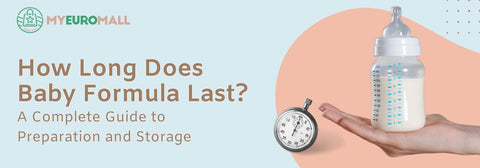Introduction
Imagine you’re cradling your newborn, fumbling with a bottle for the first
time, and thinking, "How much baby formula does this tiny human need?
And
what
happens next month?" Those early feeding moments can spark a whirlwind of
questions, and trust me, every parent’s been there. Feeding your baby is a
big
deal, but it’s not the daunting puzzle it might seem.
This guide is your go-to plan for baby formula feeding schedules,
walking
you through every step from those sleepy newborn days to the busy 12- month
mark.
It’s all about giving you the tools to nourish your little one with
confidence. A smart feeding schedule for newborns and beyond fuels
their
growth keeps their days manageable, and flexes with their changing needs.
Plus, when you’re hunting for the best supplies—like organic baby
formula or
european baby formula — MyEuroMall has your back with premium options
to
smooth out the ride. Ready to get started? Let’s jump in!
Getting Started: Why Infant Formula Feeding Schedules Matter
Baby formula plays a critical role in your little one’s first year,
delivering the nutrients they need to thrive when breastfeeding isn’t an
option or you need a supplement. A structured feeding schedule isn’t just
about keeping their tummy full—it’s about setting the stage for healthy
development.
Why does it matter? First, baby formula provides consistent, tailored
nutrition to fuel rapid growth, from building strong bones to supporting
brain
development. Second, it creates predictability, helping you and your baby
settle into a rhythm that makes daily life easier. Finally, it ensures
healthy weight gain and milestones, giving you peace of mind. Whether you’re
using
organic baby formula or trusted european baby formula, the right
schedule makes all the difference. Check out our post 14
Baby Formula Myths
Debunked: What Every Parent Needs to Know to bust common
misconceptions and
choose wisely.
That said, flexibility is key. Every baby is unique, so while a schedule
offers structure, it should always follow your little one’s hunger cues.
Think
of it as a guide, not a strict rulebook, as you figure out what works best
for
your family.
Month-by-Month Infant Formula Feeding Schedules: Newborn to 12 Months
Your baby’s feeding needs evolve fast in their first year. Here’s how
baby
formula fits into their schedule, month by month, from those early
newborn
days to their first birthday.
Feeding Schedule for Newborns (0-4 Months)
In the newborn stage, baby formula is your baby’s sole nutrition source. Expect to offer 5-8 feedings daily, with each bottle containing 2-4 ounces, totaling 16-32 ounces over 24 hours. At this age, the feeding schedule for newborns is all about demand—look for signs like rooting or hand-to-mouth movements every 2-3 hours.Newborns have tiny stomachs, so small, frequent feedings are normal. As their appetite grows, you might notice them taking a bit more per feeding. Keep bottles of organic baby formula or european baby formula ready and watch their cues to adjust as needed.
4 to 6 Months
By 4 to 6 months, your baby’s capacity increases. They’ll likely take 5-7 baby formula feedings daily, with 4-6 ounces per bottle, totaling 24-36 ounces. Feedings can space out to every 3-4 hours as their stomach grows and they settle into a slightly more predictable pattern. Watch for fussiness or sucking motions to know when they’re ready.If your pediatrician gives the green light, you might introduce baby food like 1-4 tablespoons of infant cereal at this stage, but baby formula remains the primary focus. It’s still delivering the bulk of their nutrition.
6 to 8 Months
At 6 to 8 months, baby formula feedings drop to 4-6 times daily, with 6-8 ounces per bottle, still totaling 24-36 ounces. You can adjust to a routine— like bottles in the morning, midday, and evening—that fits your day. Monitor their intake to ensure they’re getting enough, as they’re growing fast.Optional baby food (around 4-9 tablespoons) might supplement their diet if recommended, but baby formula continues to be the key player in keeping them nourished and strong.
9 to 12 Months
From 9 to 12 months, your baby will take 3-5 baby formula feedings daily, with 6-8 ounces each, totaling 16-30 ounces. Align these with waking hours—think breakfast, lunch, and bedtime bottles—and reduce slightly as their appetite shifts. They’re more active now, so their needs might vary from day to day.Baby food, like 1/4-1/2 cup meals, may increase if your pediatrician advises, but baby formula stays essential until they hit that one-year mark, ensuring they get vital nutrients.
The Ultimate Infant Formula Feeding Chart: Nutrition by Age

To make things even easier, here’s a handy baby food chart focused on baby formula feeding amounts and frequencies for your baby’s first year. It’s a simple guide to keep you on track, with just a quick nod to baby food where it might come in.
| Age Range | Infant Formula Amoun | Feeding Frequency | Notes |
|---|---|---|---|
| 0-4 Months | 16-32 oz | 5-8 times/day (2-4 oz each) | Feed on demand every 2-3 hours. |
| 4-6 Months | 24-36 oz | 5-7 times/day (4-6 oz each) | Every 3-4 hours, baby food is optional per pediatrician. |
| 6-8 Months | 24-36 oz | 4-6 times/day (6-8 oz each) | Routine feedings; baby food can supplement. |
| 9-12 Months | 16-30 oz | 3-5 times/day (6-8 oz each) | Align with meals; baby food may increase. |
Note: Baby formula is the foundation of your baby’s diet. Always consult your pediatrician for adjustments or if you’re considering introducing baby food.
Mastering Infant Formula Feeding: Practical Tips for Parents
Baby formula is designed to meet all your baby’s nutritional needs
until their first birthday, making it a reliable choice for growth and
health. Here’s how to master it like a pro.
Start by choosing the right baby formula — whether cow’s milk-based,
soy, or hypoallergenic—based on your baby’s needs and your pediatrician’s
guidance. Want something extra special? Try organic baby formula or
european baby formula for high-quality options. Preparation is key:
follow mixing instructions exactly, use clean bottles, and store prepared
formula safely (refrigerated for no more than 24 hours). Learn more in our
guide, How
Long Does Baby Formula Last? A Complete Guide to Preparation and
Storage. As your baby grows, adjust the amount and frequency—those
tiny 2-ounce feedings will soon become hearty 8-ounce bottles!
Need quality options? MyEuroMall offers a range of high-quality baby
formula, including organic baby formula and european baby
formula, to suit every baby, making it easy to find the perfect fit.
baby food may be introduced later as an optional step, but for now,
baby formula is your go-to. Keep it simple and trust the process.
Building a Strong Start: Healthy Formula Feeding Habits
Consistent baby formula feeding lays a solid foundation for your
baby’s growth and routine. It’s not just about filling their belly—it’s
about teaching them to eat when they’re hungry and stop when they’re full.
Watch for hunger cues like rooting or sucking on their hands and fullness
signs like turning away or slowing down. Overfeeding can happen if you push
past those signals, so let your baby lead.
The long-term payoff is huge: baby formula feeding sets up
nutritional health, giving your baby the energy and nutrients they need now,
with baby food as a future transition down the road. If you ever feel
unsure, your pediatrician is there to offer personalized advice—don’t
hesitate to reach out.
Conclusion
From those first newborn bottles to the final months before their first
birthday, baby formula feeding schedules are your roadmap to a
well-nourished baby. This guide and baby food chart make it easy to
track how much and how often to feed, adapting as your little one grows from
16-32 ounces a day to 16-30 by year’s end. You’re not just feeding your
baby—you’re giving them a strong start for a healthy future.
Ready to master baby formula feeding? Discover MyEuroMall’s premium
baby formula, including organic baby formula and european
baby formula, plus feeding essentials to support your baby’s first
year.
Subscribe to MyEuroMall’s newsletter below for expert tips, product
updates, and parenting hacks delivered straight to your inbox!




